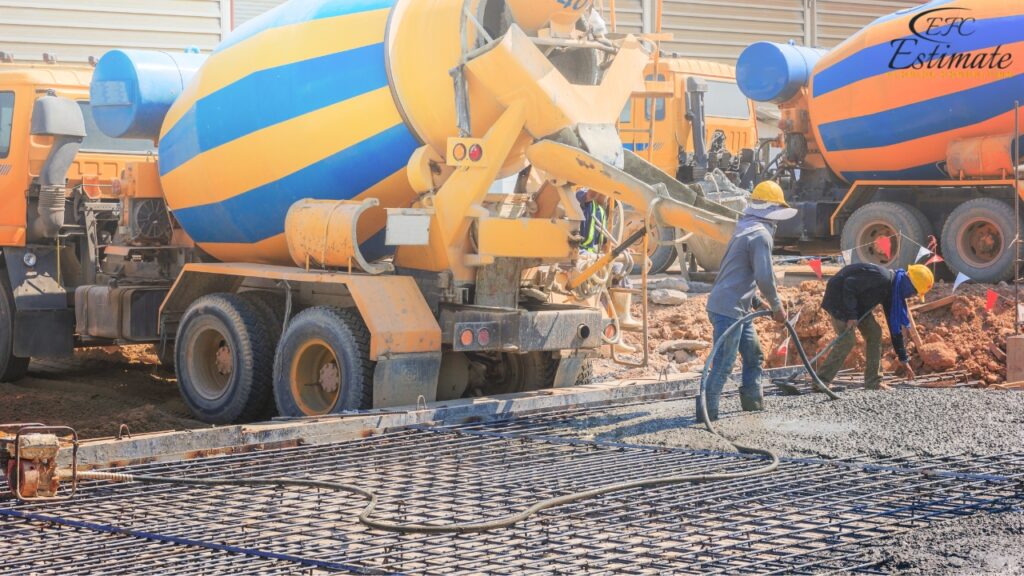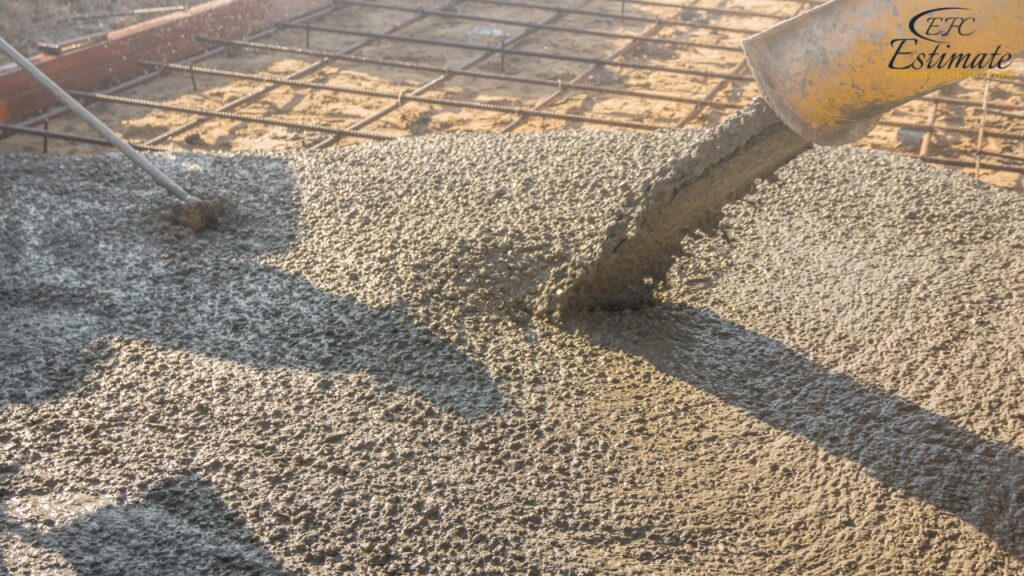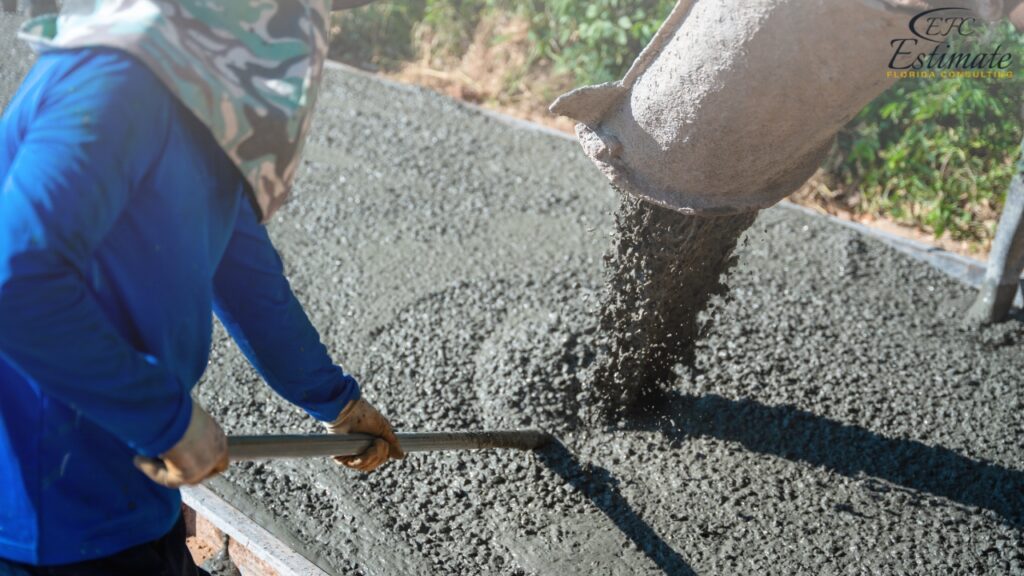How Much Does It Cost to Pour Concrete?
Pouring concrete typically costs between $4,325 and $11,451, averaging $6 to $16 per square foot. This price includes materials, labor, site preparation, and necessary permits. The total cost can vary based on the project’s size, concrete thickness, and complexity. Choosing high-strength or decorative concrete can also increase the cost. Additional expenses might include excavation, reinforcement, or finishing work. Investing in quality concrete ensures a durable, long-lasting surface for driveways, patios, or foundations. Proper planning and budgeting are essential to achieve the best results, tailored to your specific project needs and preferences.

Factors Influencing the Cost of Pouring Concrete
Project Size
The size of the concrete project is one of the most significant factors affecting the overall cost. Larger projects require more concrete and labor, increasing the total expense. Additionally, the complexity of the project, including any intricate designs or specific structural requirements, can impact the cost. Understanding how size influences costs can help plan the budget more accurately and make decisions about the scale of the project.
Cost Breakdown by Project Size
The cost of pouring concrete is typically calculated per square foot or per cubic yard. Here is an estimated cost range for different sizes of concrete projects:
Project Size | Estimated Cost per Sq Ft | Estimated Cost per Cubic Yard | Total Cost Range |
Small Project (100 Sq Ft) | $10.14 – $13.52 | $202.80 – $253.50 | $1,014 – $1,352 |
Medium Project (500 Sq Ft) | $10.14 – $13.52 | $202.80 – $253.50 | $5,070 – $6,760 |
Large Project (1,000 Sq Ft) | $10.14 – $13.52 | $202.80 – $253.50 | $10,140 – $13,520 |
Smaller projects, such as a 100 square foot patio, may have a higher cost per square foot due to fixed costs that don’t scale with size. Conversely, larger projects benefit from economies of scale, potentially lowering the cost per square foot. However, larger projects may also require more sophisticated planning and execution, which can add to the cost.
Type of Concrete
The type of concrete used can significantly impact the cost. Different types of concrete have varying properties and uses, and choosing the right type for the project is crucial. Standard concrete is commonly used for most residential projects, while high-strength or specialized concrete might be needed for specific applications. Understanding the different types of concrete and their costs can help select the most suitable option for the project.
Cost Breakdown by Concrete Type
Type of Concrete | Cost per Cubic Yard | Total Cost for 10 Cubic Yards |
Standard Concrete | $202.80 – $253.50 | $2,028 – $2,535 |
High-Strength Concrete | $253.50 – $338.00 | $2,535 – $3,380 |
Stamped Concrete | $338.00 – $507.00 | $3,380 – $5,070 |
Colored Concrete | $304.20 – $405.60 | $3,042 – $4,056 |
Standard concrete is the most economical option and is suitable for most residential applications. High-strength concrete is used in projects that require additional durability, such as driveways or commercial buildings. Stamped and colored concrete are often chosen for decorative purposes, adding aesthetic appeal but also increasing the overall cost.
Labor Costs
Labor costs are a significant portion of the total expense when pouring concrete. Professional contractors typically charge by the hour or by the square foot. Factors such as the complexity of the project, the condition of the site, and local labor rates will influence these costs. Hiring experienced professionals ensures a high-quality finish and can save time and money in the long run. Proper labor planning is essential for ensuring the project is completed efficiently and to a high standard.

Labor Cost Breakdown
Labor Task | Estimated Cost per Hour | Estimated Hours Needed | Total Labor Cost |
Site Preparation | $67.60 – $101.40 | 5 – 10 | $338 – $1,014 |
Concrete Pouring | $67.60 – $101.40 | 10 – 20 | $676 – $2,028 |
Finishing and Curing | $67.60 – $101.40 | 5 – 10 | $338 – $1,014 |
Site preparation includes tasks such as clearing the area, setting up forms, and ensuring the ground is level. Concrete pouring involves mixing and pouring the concrete, followed by finishing and curing to ensure a smooth and durable surface. Each of these stages requires skilled labor to achieve the best results.
Additional Costs
Additional costs may include materials such as rebar, wire mesh, and any special treatments or finishes. These costs can vary depending on the specific requirements of the project. Properly accounting for these materials and treatments can prevent unexpected budget overruns and ensure that all aspects of the project are covered. Investing in quality materials can enhance the durability and appearance of the concrete.
Additional Materials and Treatments
Item | Estimated Cost | Total Additional Cost |
Rebar | $1.65 – $3.30 per foot | $165 – $330 |
Wire Mesh | $0.17 – $0.34 per Sq Ft | $170 – $340 |
Concrete Sealer | $101.40 – $202.80 | $101.40 – $202.80 |
Rebar and wire mesh are used to reinforce the concrete, increasing its strength and preventing cracking. Concrete sealer is applied to protect the surface from moisture, stains, and wear, extending the life of the concrete. These additional materials and treatments contribute to the overall quality and longevity of the project.
Get 5 New Leads Next 7Days With Our System
- Multi-Family Building
- Hotel Building
- Hospital Building
- Warehouse Building
- High-Rise Building
- Shopping Complex
Cost of Concrete Delivery
Delivering concrete to the site can add to the total cost. Delivery charges depend on the distance from the concrete plant to the site, the amount of concrete needed, and any specific delivery requirements. Proper delivery planning ensures that the concrete arrives on time and is ready for pouring, preventing delays and additional costs.
Concrete Delivery Costs
Delivery Task | Estimated Cost | Total Cost |
Delivery Fee | $169 – $338 per trip | $169 – $338 |
Additional Fees (e.g., waiting time) | $67.60 – $101.40 per hour | $67.60 – $101.40 per hour |
Ensuring timely delivery of concrete is crucial for maintaining the project schedule. Delays in delivery can cause the concrete to set prematurely, resulting in additional labor costs and potential waste. Planning for delivery logistics can help minimize these risks.
Permits and Inspections
In some areas, obtaining permits or inspections may be necessary for concrete projects. These additional requirements can add to the overall cost but are essential for legal compliance and safety. Homeowners should budget for these costs and ensure that all necessary permits are obtained before starting the project.
Permits and Inspection Costs
Task | Estimated Cost | Total Cost |
Building Permits | $169 – $676 | $169 – $676 |
Inspections | $101.40 – $338 | $101.40 – $338 |
Obtaining the proper permits ensures that the project complies with local building codes and regulations. Inspections verify that the concrete work meets safety and quality standards. Budgeting for these costs can prevent legal issues and ensure a smooth project.
Additional Considerations
Choosing the Right Contractor
Hiring a reputable and experienced concrete contractor is crucial for achieving the best results. Homeowners should obtain multiple quotes, check references, and review previous work to ensure they select the right professional for the job. A good contractor will provide detailed estimates, clear timelines, and a warranty for their work, ensuring peace of mind and high-quality results. Selecting the right contractor can make a significant difference in the overall quality and longevity of the concrete work.

Timing and Weather Conditions
The timing of the concrete project can impact the overall cost and quality of the job. Pouring concrete during optimal weather conditions, such as mild temperatures and low humidity, can ensure better curing and a smoother finish. Avoiding extreme temperatures and rainy seasons can also result in lower labor costs and quicker project completion. Properly planning the timing can enhance the durability and appearance of the concrete. Additionally, scheduling the project during the right season can help avoid issues related to extreme weather, which can affect the curing process.
Long-Term Maintenance
Investing in high-quality concrete and proper finishing can extend the lifespan of the project, reducing the need for frequent repairs. Regular maintenance, such as sealing and cleaning the concrete surface, can help maintain its appearance and durability. Implementing a maintenance plan can save money and keep the concrete looking fresh for longer. Regular upkeep can also prevent larger issues, such as cracks or erosion, which can be costly to repair. Proper maintenance ensures that the concrete remains in good condition, providing lasting value for the investment.
Environmental Considerations
Choosing eco-friendly concrete options can also impact the cost. Environmentally friendly concrete mixes, such as those incorporating recycled materials or low-carbon cement, may have a higher initial cost but offer long-term environmental benefits. Additionally, proper disposal of concrete waste and the use of sustainable construction practices can contribute to the overall sustainability of the project.
Eco-Friendly Concrete Costs
Type of Eco-Friendly Concrete | Cost per Cubic Yard | Total Cost for 10 Cubic Yards |
Recycled Aggregate Concrete | $234 – $312 | $2,340 – $3,120 |
Low-Carbon Cement Concrete | $286 – $364 | $2,860 – $3,640 |
Investing in eco-friendly concrete options supports environmental sustainability and can enhance the project’s appeal to environmentally conscious homeowners and buyers.
Additional Features and Customizations
Adding custom features or enhancements to the concrete project can increase the overall cost. These might include decorative elements, special finishes, or integrated heating systems for driveways. While these features can enhance the functionality and appearance of the concrete, they also add to the project’s complexity and cost.
Costs for Additional Features
Feature | Estimated Cost | Total Additional Cost |
Decorative Stamping | $8.45 – $16.90 per Sq Ft | $845 – $1,690 per 100 Sq Ft |
Integrated Heating System | $50.70 – $101.40 per Sq Ft | $5,070 – $10,140 per 100 Sq Ft |
Custom Coloring | $3.38 – $6.76 per Sq Ft | $338 – $676 per 100 Sq Ft |
Custom features can significantly enhance the value and appeal of the concrete project, making it more functional and aesthetically pleasing.
Financing Options
Given the potential high costs of pouring concrete, exploring financing options can help manage the expenses. Home improvement loans, personal loans, or lines of credit can provide the necessary funds to complete the project. Understanding the terms and conditions of these financing options can help homeowners choose the best solution for their financial situation.
Financing Options Overview
Financing Option | Interest Rate Range | Estimated Monthly Payment (for $10,000 loan) |
Home Improvement Loan | 4% – 10% | $200 – $350 |
Personal Loan | 6% – 15% | $250 – $400 |
Line of Credit | 5% – 12% | Varies based on usage |
Selecting the right financing option can provide the necessary capital to complete the project without straining current financial resources.
Safety Considerations
Safety is paramount when working with concrete. Proper safety gear, such as gloves, goggles, and masks, should be worn to protect against concrete burns and inhalation of dust. Ensuring that the work area is well-ventilated and that all safety protocols are followed can prevent accidents and injuries.
Safety Equipment Costs
Safety Equipment | Estimated Cost | Total Cost |
Gloves | $10 – $20 per pair | $10 – $20 |
Goggles | $15 – $30 per pair | $15 – $30 |
Masks | $20 – $40 per pack | $20 – $40 |
Investing in proper safety equipment is essential for protecting workers and ensuring a safe working environment.
Download Template For Concrete Project Breakdown
- Materials list updated to the zip code
- Fast delivery
- Data base of general contractors and sub-contractors
- Local estimators

Conclusion
Pouring concrete involves various costs, including materials, labor, additional treatments, delivery, permits, inspections, and potential custom features. By understanding and planning for these costs, homeowners can create a realistic budget and ensure the successful completion of their concrete project. Properly budgeting for all aspects of the project helps avoid financial surprises and ensures that the concrete work is completed to high standards. With careful planning and attention to detail, homeowners can achieve a durable, aesthetically pleasing, and functional concrete surface that meets their needs and stands the test of time. Additionally, considering environmental and safety aspects can further enhance the project’s sustainability and overall success.
FAQs
Pouring concrete typically costs between $4,325 and $11,451, averaging $6 to $16 per square foot. This estimate includes materials, labor, site preparation, and necessary permits.
Key factors include the project size, concrete thickness, type of concrete, complexity, site preparation, labor, and additional treatments or customizations.
Larger projects require more concrete and labor, increasing the total cost. Smaller projects may have higher costs per square foot due to fixed expenses. Economies of scale can lower the cost per square foot for larger projects.
- Small Project (100 Sq Ft): $1,014 – $1,352
- Medium Project (500 Sq Ft): $5,070 – $6,760
- Large Project (1,000 Sq Ft): $10,140 – $13,520
Different types of concrete have varying properties and costs. Standard concrete is more economical, while high-strength, stamped, or colored concrete increases the cost.
- Standard Concrete: $202.80 – $253.50 per cubic yard
- High-Strength Concrete: $253.50 – $338.00 per cubic yard
- Stamped Concrete: $338.00 – $507.00 per cubic yard
- Colored Concrete: $304.20 – $405.60 per cubic yard
Labor costs include site preparation, concrete pouring, and finishing. These costs can vary based on the complexity of the project and local labor rates.
Additional costs may include materials like rebar, wire mesh, and concrete sealer. Properly accounting for these materials ensures a durable and high-quality finish.
Delivery charges depend on the distance from the concrete plant, the amount of concrete needed, and any specific delivery requirements.
Google Reviews



Process To Get It Cost to Pour Concrete Estimate Report
Here I am going to share some steps to get it cost to pour concrete estimate report.
-
You need to send your plan to us.
You can send us your plan on info@estimatorflorida.com
-
You receive a quote for your project.
Before starting your project, we send you a quote for your service. That quote will have detailed information about your project. Here you will get information about the size, difficulty, complexity and bid date when determining pricing.
-
Get Estimate Report
Our team will takeoff and estimate your project. When we deliver you’ll receive a PDF and an Excel file of your estimate. We can also offer construction lead generation services for the jobs you’d like to pursue further.

